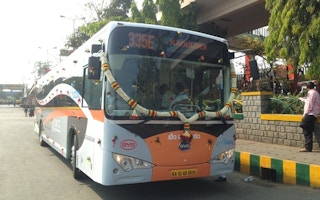Chinese electric vehicle manufacturer BYD on Friday did a test run of its 40-foot tall electric bus in India’s southern city of Bangalore - the country’s first zero-emissions public transport.
The purely electric bus, powered through BYD’s non-toxic iron-phosphate batteries, will be tried for three months and operated by the state-run Bangalore Metropolitan Transport Corporation (BMTC).
The world’s largest maker for rechargeable batteries said the bus could operate for more than 250 kilometres on a single charge, even in heavy traffic. Its batteries also do not contain toxic electrolytes or heavy metals and can be completely recycled.
The trial-run is a welcome move supported by the state government of Karnataka as the city is known in India for its high levels of air pollution caused by vehicle emissions.
“
The government targets to populate India’s roads with 6 million to 7 million new electric vehicles by 2020
While electric cars are increasingly becoming popular among residents of the Indian city, which is also home to local electric car maker Mahindra Reva, the launch of the electric bus will give city commuters the chance to experience the electric vehicles at the same cost as riding their regular buses.
The BYD bus, which comes at a higher initial price tag compared to conventional air-conditioned buses, will have the same fare as that of other buses currently operating in the same urban routes, according to BMTC.
BMTC officials said the total cost of the vehicle could be offset in the long-term given the high prices of diesel-fueled buses, including maintenance cost.
BYD noted that running an electric bus is more cost-effective compared to a fossil fuel-powered bus in India. Traditional diesel buses consume 0.55 litres of diesel per kilometre in India, while a BYD bus that does not operate with air-conditioning consumes only about 1 Kwh electricity per kilometre.
Utopia Automation Control, BYD’s distribution partner in India, said it is optimistic that the trial-run will pave the way for further growth in the electric vehicle market in India.
In January last year, the government announced the country’s National Electric Mobility Mission Plan 2020, which detailed its plans to spur local investments in hybrid and electric vehicles in India. Under the plan, the government targets to populate India’s roads with 6 million to 7 million new electric vehicles by 2020.
Liu Xueliang, BYD’s general manager for Asia-Pacific Group commented, “We are very excited to work with partners like BMTC and Utopia to put India’s first electric bus into operation. It will not only contribute to the new energy vehicle development and application in Karnataka state but (also) the whole of India.”
BYD will also soon find its electric buses on Kuala Lumpur’s main roads. The company said in February it has won the bid to supply 15 new battery-run electric transit buses for state-run Rapid KL to be used as shuttle buses in Kuala Lumpur’s first bus rapid transit line for electric buses.

















